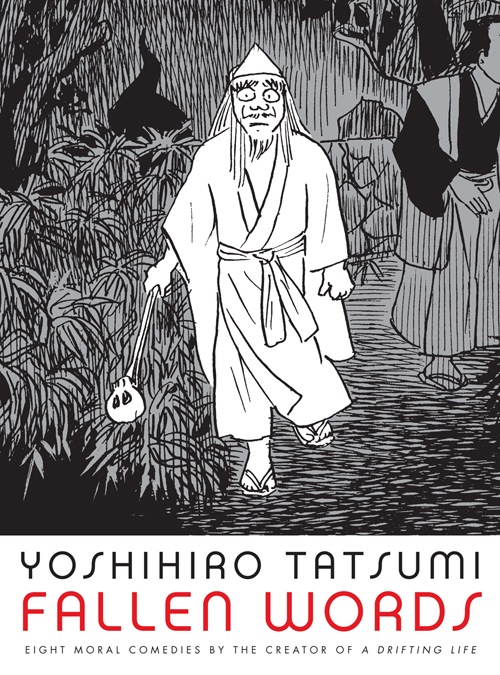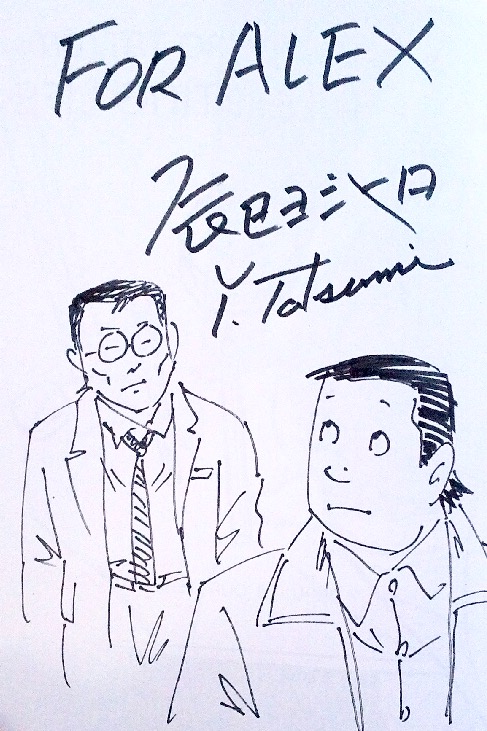Manga-ka Yoshihiro Tatsumi has died at the age of 79. Paul Gravett broke the news on his blog, saying that he got an e-mail from director Eric Khoo, who directed a documentary about the artist, saying simply, “Sensei is dead.”
Tatsumi was a pioneer of manga for adults, which he called “gekiga,” or “dramatic pictures,” as opposed to “manga,” which means “whimsical pictures.” During the course of his long career he won numerous awards, including the Osamu Tezuka Cultural Prize (Japan), the Angouleme Prix Regards Sur le Monde (France), and numerous Eisner, Harvey, and Ignatz awards (U.S.). Drawn and Quarterly has published six of his works in English: The Push Man and Other Stories, Abandon the Old in Tokyo, Good-Bye, Black Blizzard, A Drifting Life, and Fallen Words.
As word of his death spread, several people shared their stories of meeting Tatsumi.
Peggy Burns of Drawn & Quarterly, Tatsumi’s publisher:
I was lucky enough to spend two weeks with him and his wife on his two trips to North America, two of the most fulfilling times of my career. He was gentle, sweet and kind and would always get me to tell him stories about my kids. Anne Ishii and I spent two days with him stock signing in NYC, where he would do the most ornate drawings in each books, over hundred of books received this special treatment. We kept trying to get him to speed up, and tried to tell him he didn’t have to do such ornate drawings. He told us: If when in his twenties, when he was broke and trying to make it as an artist that in his 70s, he and his wife would be flown to the USA, the very least he can do, is a drawing for each of the people who will buy the books.
Alex Cox remembers meeting Tatsumi and his wife when they visited his Brooklyn comics shop. At that time, Tatsumi was only beginning to realize how popular his early works were in this country:
As Tatsumi left, I had no idea how to address him, unaccustomed as I am to Japanese etiquette. I bowed and said “Arigato, Tatsumi-Sensei,” hopefully using the correct honorific (and pronunciation) to address a master of his craft. He stalled momentarily before shaking my hand warmly.
Closing in on age 70, he was still getting used to the idea that he was considered Sensei by thousands of people on the other side of the world.
Adrian Tomine, Tatsumi’s editor at Drawn and Quarterly:
It didn’t take long for me to discover that, despite differences of age, geography, history, etc., Tatsumi-sensei reminded me very much of all the other great cartoonists I’ve had the fortune of becoming friends with. He could be taciturn and occasionally inscrutable, but in the right circumstances, he’d open up with humor, inquisitiveness, and an unflagging excitement about the process of making comics. I’d studied and learned from his work since I was a teenager, but I think Tatsumi’s humility, generosity, and artistic determination were as inspirational to me as any of his stories. I had several occasions–usually when one of us was dashing off to catch a plane–to offer my best attempt at a bow and to say “thank you,” but I always felt that I hadn’t been clear or emphatic enough, and that he was too modest to fully accept all that I was thanking him for.
Here’s a handful of other links about Tatsumi; post your favorites in the comments and I’ll add them here.
Deb Aoki’s 2009 interview with Tatsumi
Ryan Sands covers Tatsumi’s 2009 appearance at TCAF
The Toronto Star’s 2009 interview with Tatsumi
Dwight Garner’s review of A Drifting Life in the New York Times
Update: Here are some more posts and tributes that have appeared in the week after Tatsumi’s death:
Jocelyne Allen, who was Tatsumi’s translator at TCAF and also the translator of Fallen Words, shares some memories and discusses his short story collection Kessakusen
Ryan Holmberg’s obituary at The Comics Journal, a detailed account of Tatsumi’s life that also puts his accomplishments in context
Gary Groth’s very in-depth interview with Tatsumi, first published in 2007
Bruce Weber’s obituary in the New York Times
Elaine Woo’s obituary in the Los Angeles Times


One of the true greats. He helped show how serious manga could be, and while unheard of to many, the influence he’s made is incredible.
Whereas some of these artists aimed for strife, violence and being hard-boiled, Tatsumi managed poetry and sublime reality. Truly, he’s captured the hearts of many, from around the world.
But he wasn’t alone, and I do wish we could have more works of his peers in English like Masahiko Matsumoto. Together they refined their craft, experimented and challenged each other to create the stories that persist today.
As the ranks have almost disappeared, it makes me genuinely appreciate the work he did in making A Drifting Life. I often wonder what he thought of the current industry though, but I get the impression he realized he was an old man in a young man’s world.